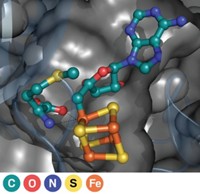Advertisement
Grab your lab coat. Let's get started
Welcome!
Welcome!
Create an account below to get 6 C&EN articles per month, receive newsletters and more - all free.
It seems this is your first time logging in online. Please enter the following information to continue.
As an ACS member you automatically get access to this site. All we need is few more details to create your reading experience.
Not you? Sign in with a different account.
Not you? Sign in with a different account.
ERROR 1
ERROR 1
ERROR 2
ERROR 2
ERROR 2
ERROR 2
ERROR 2
Password and Confirm password must match.
If you have an ACS member number, please enter it here so we can link this account to your membership. (optional)
ERROR 2
ACS values your privacy. By submitting your information, you are gaining access to C&EN and subscribing to our weekly newsletter. We use the information you provide to make your reading experience better, and we will never sell your data to third party members.
Biological Chemistry
How Gut Microbes Cut Choline Down To Size
Combination of genetic, biochemical, and spectroscopic evidence points to an enzyme with a glycine-derived radical
by Carmen Drahl
December 3, 2012
| A version of this story appeared in
Volume 90, Issue 49
Harvard University chemists have solved a 100-year mystery—how gut bacteria split the nutrient choline into trimethylamine and acetaldehyde (Proc. Natl. Acad. Sci. USA, DOI: 10.1073/pnas.1215689109). The microbes, it turns out, use an enzyme with a glycine-derived radical. This transformation, first reported in 1910, lies at the start of a metabolic pathway linked to diseases, including a rare ailment that causes fishy body odor. Smaranda Craciun and Emily P. Balskus searched the genome of a choline-degrading microbe for enzymes resembling those that break down ethanolamine, a molecule similar to choline. They turned up a set of genes, including one encoding a glycyl radical enzyme. The researchers show that the genes are involved in making fishy-smelling trimethylamine. Electron paramagnetic resonance spectroscopy on bacteria supplied with choline confirmed that a glycine-centered radical was present. The enzyme cleaves a C–N bond—so far, no other glycyl radical enzyme can do that, Balskus notes. With this information, scientists could someday analyze human gut microflora to determine whether they are a factor in developing trimethylamine-related diseases, says choline expert Steven H. Zeisel of the University of North Carolina, Chapel Hill.





Join the conversation
Contact the reporter
Submit a Letter to the Editor for publication
Engage with us on Twitter